#Las Americas Immigrant Advocacy Center
Text
A federal judge in Austin on Thursday halted a new state law that would allow Texas police to arrest people suspected of crossing the Texas-Mexico border illegally.
The law, Senate Bill 4, was scheduled to take effect Tuesday. U.S. District Judge David Ezra issued a preliminary injunction that will keep it from being enforced while a court battle continues playing out. Texas is being sued by the federal government and several immigration advocacy organizations. Texas appealed the ruling to the conservative 5th U.S. Circuit Court of Appeals.
Ezra said in his order Thursday that the federal government “will suffer grave irreparable harm” if the law took effect because it could inspire other states to pass their own immigration laws, creating an inconsistent patchwork of rules about immigration, which has historically been upheld as being solely within the jurisdiction of the federal government.
“SB 4 threatens the fundamental notion that the United States must regulate immigration with one voice,” Ezra wrote.
Ezra also wrote that if the state arrested and deported migrants who may be eligible for political asylum, that would violate the Constitution and also be "in violation of U.S. treaty obligations."
"Finally, the Court does not doubt the risk that cartels and drug trafficking pose to many people in Texas," Ezra wrote in his ruling. "But as explained, Texas can and does already criminalize those activities. Nothing in this Order stops those enforcement efforts. No matter how emphatic Texas’s criticism of the Federal Governments handling of immigration on the border may be to some, disagreement with the federal government’s immigration policy does not justify a violation of the Supremacy Clause."
Gov. Greg Abbott signed SB 4 in December, marking Texas’ latest attempt to try to deter people from crossing the Rio Grande after several years of historic numbers of migrants arriving at the Texas-Mexico border.
In a statement, Abbott said the state "will not back down in our fight" and that he expects this case would eventually be decided by the U.S. Supreme Court. On social media, he wrote that he is "not worried" because "this was fully expected."
"Texas has solid legal grounds to defend against an invasion," he added.
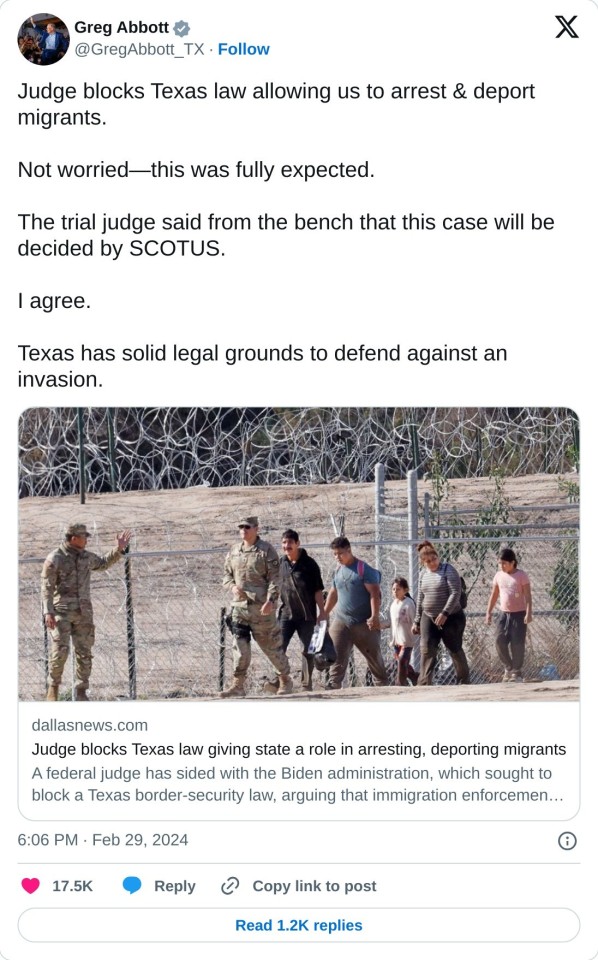
State Attorney General Ken Paxton, whose office is defending SB 4 in court, said in a statement that he "will do everything possible to defend Texas’s right to defend herself."
The law seeks to make illegally crossing the border a Class B misdemeanor, carrying a punishment of up to six months in jail. Repeat offenders could face a second-degree felony with a punishment of two to 20 years in prison.
The law also seeks to require state judges to order migrants returned to Mexico if they are convicted; local law enforcement would be responsible for transporting migrants to the border. A judge could drop the charges if a migrant agrees to return to Mexico voluntarily.
In December, the American Civil Liberties Union, the ACLU of Texas and the Texas Civil Rights Project sued Texas on behalf of El Paso County and two immigrant rights organizations — El Paso-based Las Americas Immigrant Advocacy Center and Austin-based American Gateways — over the new state law. The following month, the U.S. Department of Justice filed its lawsuit against Texas. The lawsuits have since been combined.
During a court hearing on Feb. 15 in Austin, the Department of Justice argued that SB 4 is unconstitutional because courts have ruled that immigration solely falls under the federal government’s authority.
The lawyer representing Texas, Ryan Walters, argued that the high number of migrants arriving at the border — some of them smuggled by drug cartels — constitutes an invasion and Texas has a right to defend itself under Article I, Section 10 of the U.S. Constitution, which prohibits states from engaging in war on their own “unless actually invaded.”
Ezra said that he “is not unsympathetic to the concerns raised by Abbott,” but appeared unconvinced by Walters’ argument.
"I haven't seen, and the state of Texas can't point me to any type of military invasion in Texas," Ezra said. "I don't see evidence that Texas is at war."
Immigrant rights advocates around the state celebrated the ruling because they worried that SB 4 would lead to border residents' rights being violated.
"We celebrate today’s win, blocking this extreme law from going into effect before it has the opportunity to harm Texas communities," said Aron Thorn, senior attorney for the Beyond Border Program at Texas Civil Rights Project. "This is a major step in showing the State of Texas and Governor Abbott that they do not have the power to enforce unconstitutional, state-run immigration policies."
Edna Yang, co-executive director at American Gateways, said that SB 4 does not fix “our broken immigration system” and it will divide communities.
“This decision is a victory for all our communities as it stops a harmful, unconstitutional, and discriminatory state policy from taking effect and impacting the lives of millions of Texans," she said. "Local officials should not be federal immigration agents, and our state should not be creating its own laws that deny people their right to seek protection here in the U.S."
David Donatti, senior staff attorney at the ACLU of Texas, said the ruling is an "important win for Texas values, human rights, and the U.S. Constitution."
"Our current immigration system needs repair because it forces millions of Americans into the shadows and shuts the door on people in need of safety. S.B. 4 would only make things worse," he said. "Cruelty to migrants is not a policy solution.”
#us politics#news#republicans#conservatives#gop#Gov. Greg Abbott#texas#Senate Bill 4#Judge David Ezra#immigrants#immigration#migrants#us mexico border#5th U.S. Circuit Court of Appeals#us constitution#political asylum#Supremacy Clause#Ken Paxton#American Civil Liberties Union#ACLU of Texas#Texas Civil Rights Project#Las Americas Immigrant Advocacy Center#American Gateways#department of justice#2024
23 notes
·
View notes
Text





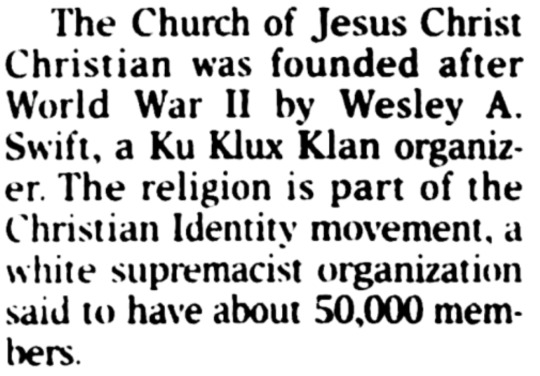
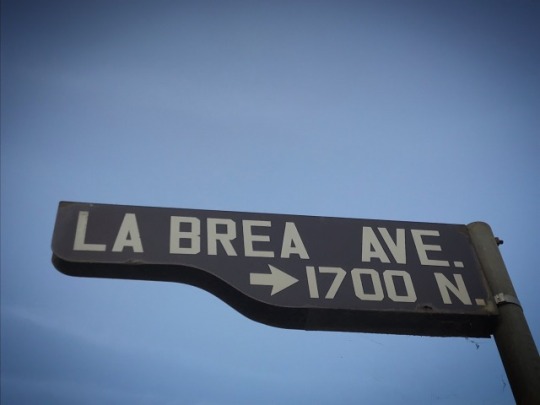





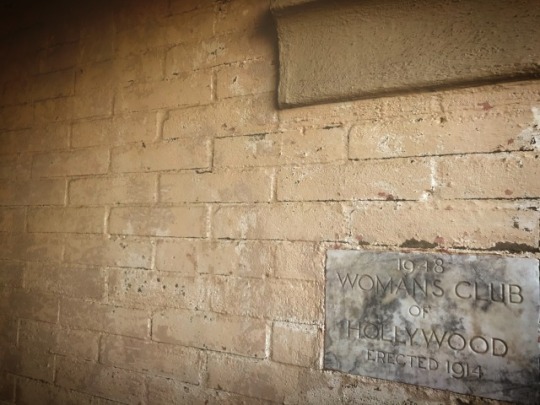

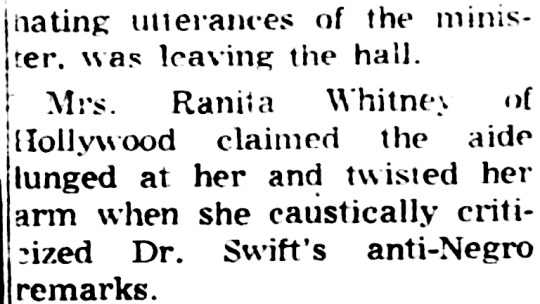



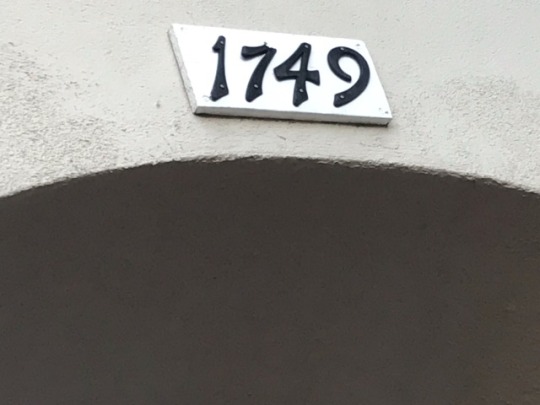


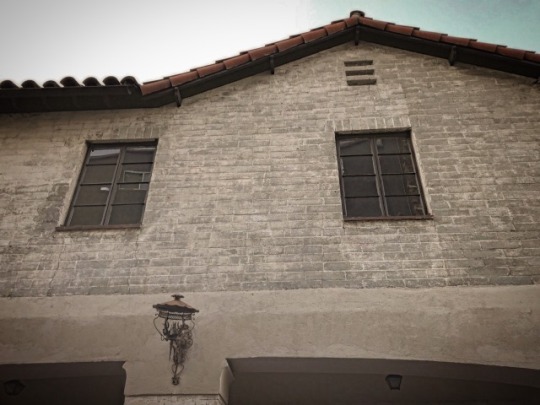


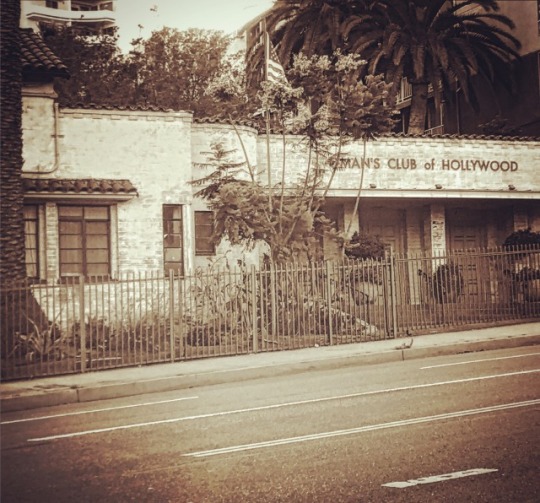
The Woman's Club of Hollywood is located at 1749 La Brea directly south of Franklin Avenue. It is right in the dead center of Hollywood, California. The venue is sometimes rented out for weddings.
However, their website has completely scrubbed its sordid history.
The LA Conservancy doesn't mention it either.
This ancient building has always had a weird vibe. Well, no wonder.
For ten years, from 1958 through 1968, it was the home base of "Christian Identity" preacher Wesley A. Swift.
He was bankrolled by an anti-Semitic haberdasher from downtown Los Angeles named James Oviatt. The downtown Oviatt Building is also rented out for weddings and the LA Conservancy leads an architectural tour of the building in which they fail to mention its Klan history.
Oviatt gave money to Wesley Swift to help assemble militias in the Antelope Valley for the purpose of weapons training with the ultimate goal of doing violent battle with Dr. Martin Luther King Jr. and the Civil Rights Movement. The organization became better known in the 1970s as the "Aryan Nations."
A sermon delivered by Wesley A. Swift in this venue in February 1965 was typical:
"I have here one of the most unique pieces of writing in a newspaper. This is Baldwin. Black Baldwin. The scum of Negroes today. Called a brilliant writer and a great author and a great intellectual. Well, his kind of intellect belongs in a pig pen. What he says in his writing, in a piece of literature, called literature, that goes into our schools as literature ... every time he sees a white girl - he wants to rape her! He wants to assault every white woman to bring her down to his level, which proves he knows he's not up on your level. And he can only think of depravity and immorality to bring the levels together, that means to bring you down ... He says we don't have any nation, we don't have any flag, but we're going to get one! We're going to get it by violence and bloodshed and revolution! The Negroes gonna rise and take over! And that was in the San Francisco Chronicle last week. You say: what caused all this? It's because we have not heeded divine law and we have permitted those that are not willing to follow the laws of God to gain ascendency in our nation."
During a sermon delivered here in July 1964 he railed against the Civil Rights Act:
"This tyrannical bill known as the Civil Rights legislation which passed the house this week … The house passed a bill ... which is so filled with state and federal tyranny that it denies you and any establishment, even a church, the right to criticize or to disagree with any law relative to desegregation and anti-discrimination!
"Makes it all so mandatory that there be prosecution against anybody who violates this law by securing the facts. A church would not be permitted to advocate the gospel of Christ or preach the content of this bible without violating their law as it relates to discrimination against pagan religions and against other gods.
"One could not tell the story of the advocacy of God selecting and electing your race to this responsibility of world leadership without a differentiation between races … and if you declare the thing that God is advocating you'd be subject to prosecution!
"Civil rights legislation, which is not civil rights, but wrongs to the great Christian majority intended on mongrelizing your race and destroying your faith and reducing your nation ... to ... an elite core of evil … I think it should be a basic Christian project of every Christian to do all that he can to see that the persons who would surrender the liberties of these United States into the hands of the dictatorial authorities [are not re-elected]."
From his La Brea Avenue pulpit, Swift ranted against the changing immigration laws of the mid-1960s:
"Why do they want to destroy our immigration laws? Because immigration laws are the result of the Church's recognition that if we permit a flood of immigration into America of pagans and Africans and Asiatics that can out vote and out maneuver Christians, that they'll take over America and our freedoms will go!
"If you don't think this is the strategy, then you turn very carefully and examine the texts … which these Swedish and Negro Communists wrote."
Swift frequently invoked terms like "freedom" and "liberty" in defense of his view point and characterized Civil Rights laws and anti-bigotry as "tyranny."
He delivered horrific, racist sermons right here in the heart of Hollywood every single Sunday for a decade - and I have yet to see anyone acknowledge it.
15 notes
·
View notes
Text
“Just Being Racist”: Biden & Trump Push Anti-Immigrant Policies in Dueling Border Visits
youtube
Joe Biden and Donald Trump both visited the U.S.-Mexico border in Texas on Thursday, where the two leading presidential candidates each pitched anti-immigration measures to further militarize the border and restrict asylum. Meanwhile, a federal judge blocked a new Texas law set to go into effect that would give police the power to arrest migrants they suspect of entering the U.S. without authorization.
For more, we speak with Marisa Limón Garza, executive director of Las Americas Immigrant Advocacy Center, one of the groups challenging this Texas law. “Clearly, Texas has become a battleground for the soul of this nation,” she says, adding that regardless of which party is in power, immigrant communities come under attack.
Transcript:
2 notes
·
View notes
Text
Rights advocates on Tuesday blasted the conservative majority of the U.S. Supreme Court for allowing Texas to enforce Senate Bill 4, a contested law empowering local and state authorities to arrest and deport undocumented immigrants.
"Today's decision is disappointing and threatens the integrity of our nation's immigration laws and bedrock principles of due process," said Anand Balakrishnan, senior staff attorney at the ACLU's Immigrants' Rights Project. "But it is only preliminary and turned on the specific posture of the case. We'll continue to fight against S.B. 4 until it is struck down once and for all."
After Republican Texas Gov. Greg Abbott signed the bill in December, the national and state ACLU joined Texas Civil Rights Project (TCRP) in filing a lawsuit on behalf of American Gateways, Las Americas Immigrant Advocacy Center, and El Paso County. The U.S. Department of Justice has also argued that "it is flatly inconsistent with federal law in all its applications, and it is therefore preempted on its face."
U.S. District Judge David Ezra last month issued a preliminary injunction blocking the law from taking effect while it is challenged on constitutional grounds. The 5th Circuit Court of Appeals issued an administrative stay, which the justices left in place on Tuesday.
In a concurring opinion that Law Dork's Chris Geidner called "embarrassingly absurd," Justice Amy Coney Barrett—joined by fellow right-winger Brett Kavanaugh—highlighted that this was just a stay decision and they weren't yet weighing in on the merits.
0 notes
Photo

Shop Our Kids & Baby Collection This Weekend to Donate to Las Americas Immigrant Advocacy Center!
This weekend we’re donating 25% of our profits from our Kids & Baby collection to Las Americas Immigrant Advocacy Center, an organization that is working to help reunite immigrant families, and serve the legal needs of immigrants, asylum seekers, and refugees from around the world.
Shop this collection July 20-22, and part of your money will go towards this important work!
Items featured here, in order of appearance from left to right:
Kid’s Sparle Party 3-Pack
Baby Seals Toddler Knee High
Banner Kid’s Midcalf
Dreamer Harvest Rainbow Tube Sock
♥Lucy
Socks by Sock Dreams • Free Shipping in the US • $5 International Shipping
Find us on facebook | twitter | pinterest | instagram | sock journal | g+
61 notes
·
View notes
Text
Back In Stock: RESIST tees

CLICK HERE to order a RESIST T-shirt from my website ( Comes with a free RESIST button. Buy 2 shirts and get free US shipping)
I recently launched a new shop on my website in addition to my etsy shop where I will be donating 5% of all sales to a rescue, charity, or non-profit. This donation will be made monthly.
Non-Profits:
RAICES is a 501(c)(3) nonprofit agency that promotes justice by providing free and low-cost legal services to undeserved immigrant children, families, and refugees.
NAACP LEGAL DEFENSE FUND is America’s premier legal organization fighting for racial justice through litigation, advocacy, and public education.
LA FOOD BANK distributes healthy food for hungry neighbors in Los Angeles County. 97% of revenues go directly to our programs providing food for children, hardworking families, struggling seniors and more.
CA WILDLIFE CENTER takes responsibility for the protection of native wildlife through rehabilitation, education, and conservation. It is dedicated to the rescue and rehabilitation of native California species, who otherwise would be left to suffer from the effects of human encroachment, habitat destruction and environmental damage.
CLICK HERE TO SHOP
Thank you!
- Lili
3 notes
·
View notes
Link
Support advocacy organizations:
RAICES: This Texas-based organization offers free and low-cost legal services to immigrant children and families. Donate here and sign up as a volunteer here.
KIND (Kids In Need of Defense): The organization provides legal representation to migrant children and lobbies to ensure their rights are protected. Donate here.
Pueblo Sin Fronteras: This group provides humanitarian aid and shelter to migrants on their way to the U.S. Donate here.
Al Otro Lado: This bi-national organization provides legal services to deportees and migrants in Tijuana, Mexico, including deportee parents whose children remain in the U.S. Donate here.
The Florence Project: This Arizona-based organization offers free legal services to people in immigration custody. Donate here.
Justice in Motion: Formerly known as Global Workers Justice Alliance, this group connects attorneys and nongovernmental organizations across the U.S., Mexico, and Central America to find parents who have been deported without their children and help them reunite. Donate here.
Texas Civil Rights Project: This organization has been using legal advocacy and litigation to help families separated at the border. Donate here.
Border Angels: This California-based organization supports San Diego County's immigrant population and focuses on issues related to the U.S.-Mexico border. Donate here.
Neta: This Texas-based grassroots group helps asylum seekers on both sides of the U.S.-Mexico border. Donate here.
South Texas Pro Bono Asylum Representation Project (ProBAR): This project of the American Bar Association is currently supporting over 1,000 unaccompanied children in detention centers across South Texas. Donate here.
Fronterizo Fianza Fund: This project, run by the Detained Migrant Solidarity Committee, assists families in coming up with the bond money needed for a detained immigrant to be released. Donate here.
National Immigrant Justice Center: This program fights for policy reform and provides legal services to immigrants, refugees, and asylum-seekers. Donate here.
Las Americas Immigrant Advocacy Center: This El Paso, TX-based organization provides legal representation to migrants who otherwise can't afford it. Volunteer here and donate here.
More ways to help: ActBlue Charities has set up a link that allows you to donate to 14 different organizations, including the ACLU, United We Dream, the Asylum Seeker Advocacy Project, and more. Donate here.
63 notes
·
View notes
Text
Why Pride is Needed
Alabama Mayor Who Called For ‘Killing’ LGBTQ People Won’t ResignSeveral Carbon Hill city council members and the local Baptist pastor have urged Mayor Mark Chambers to step down.
YouTube: No, We Won't Remove These Videos of Racist, Anti-Gay Harassment Because It's Just 'Debating'
Gay Suicides Are On The Rise. This Epidemiologist Explains Why.Scientist Travis Salway discovered that suicide had surpassed HIV as the leading cause of death for gay and bisexual men in Canada.
Swastikas and Burning Pride Flags: Hate Crimes Spike in N.Y.
73 COUNTRIES WHERE IT'S ILLEGAL TO BE GAY
The body of Chynal Lindsey, a black transgender woman, was found Saturday in Dallas with “obvious signs of homicidal violence,” according to police — at least the fourth black trans woman to be killed in the Texas city in three years.
The 26-year-old’s death comes mere weeks after Muhlaysia Booker, a 23-year-old black trans woman, was found shot to death just a few miles away.
Altogether, there are now four unsolved murder cases where the victim was a young, black trans woman in the city of Dallas. Brittany White, 29, was shot to death in October 2018. Shade Schuler, 22, was found dead in 2015, also shot to death.
A Trans Asylum Seeker Dies After Pleading to ICE for Medical Care. In a disturbing pattern, ICE won’t even count Johana Medina Leon’s death among those that occurred in its custody.
Joa’s death comes almost on the anniversary of Roxsana Hernandez Rodriguez’s death in ICE custody, making Joa the second recent transgender woman asylum seeker to die in New Mexico. From 2003 to 2018, 176 people officially died while in ICE custody, and the agency hasreported an additional 10 deaths since 2018. The National Immigrant Justice Center (NIJC), however, has found that ICE dodges accountability by failing to meaningfully review deaths and that at least three deaths from 2018 went unreported. NIJC concluded that most deaths in ICE custody were related to unreasonable delays in obtaining necessary medical care, poor administration of that care, or a botched emergency response. In El Salvador, Joa had been a registered nurse and yet, in ICE detention, medical neglect appears to have played a role in her death.
Joa’s tragic death follows a series of troubling incidents that occurred at Otero County Processing Center, which is run by the for-profit Management and Training Corporation (MTC) and falls under the jurisdiction of the El Paso ICE Field Office. In March, a group of attorneys from the American Civil Liberties Union (ACLU) of New Mexico, Santa Fe Dreamers Project, and Las Americas Immigrant Advocacy Center issued a collective letter calling attention to horrendous detention conditions that were putting LGBTQ asylum seekers held at Otero in danger. As visitors to the facility, we’ve personally spoken to three of the 12 individuals referenced in that letter. Moreover, visiting LGBTQ and other persons detained at Otero, we’ve been personally subjected to threatening behavior and verbal harassment by members of the facility staff who hold leadership positions. Thus, albeit in comparatively small doses, we’ve witnessed the types of abusive attitudes and behaviors that we have heard are far worse behind locked doors.
38 notes
·
View notes
Link
It’s been nearly two months since the Trump administration announced its new “zero tolerance” policy regarding illegal immigration, which federal officials say has led to about 2,000 undocumented immigrant children in government custody being separated from their parents.
The first tent city that’ll house immigrant children opened in El Paso on Friday. Some families have been separated for months; some parents have been deported without their children.
We’ve compiled a list of organizations that are mobilizing to try and help children that have been separated from their parents at the Texas-Mexico border:
South Texas Pro Bono Asylum Representation Project is providing free legal services to asylum seekers detained in South Texas.
RAICES is a nonprofit that provides free and low-cost legal services to immigrant children, families and refugees in Texas. It’s accepting donations and volunteers at its website. In addition, the #postcards4families campaignwill donate $5 to RAICES for every postcard kids write to help the separated immigrant children.
The Austin Bar Association Civil Right and Immigration Section is coordinating training for pro bono attorneys to handle credible fear interviews for asylum seekers.
Catholic Charities of the Rio Grande Valley shelters immigrants who've recently been released from U.S. Border Patrol custody.
Lutheran Immigration and Refugee Service is raising money to provide immigrant children "immediate shelter and beds, medical services, counseling and therapy to help them deal with the trauma of family separation."
Together Rising is collecting money that'll go to advocacy groups that are working to reunify immigrant children with their families.
Asylum Seeker Advocacy Project works to prevent the deportation of asylum-seeking families fleeing violence. The group accepts donations and asks people to sign up for volunteer opportunities here.
The CARA Project is currently recruiting attorneys, law students and paralegals with experience in asylum work. The group asks volunteers to be fluent in Spanish or willing to work with an interpreter.
Kids In Need of Defense partners with major law firms, corporations and bar associations to create a nationwide pro bono network to represent unaccompanied children through their immigration proceedings. Volunteers don’t need to have immigration law experience.
The El Paso-based Las Americas Immigrant Advocacy Center provides legal representation to immigrants who might not be able to afford it otherwise. It’s accepting volunteers and donations.
American Gateways provides legal services and representation to separated parents. It's currently seeking volunteers to represent detained parents who've been separated from their children.
Diocesan Migrant & Refugee Services is the largest provider of free and low cost immigration services in West Texas and says it's the only organization in El Paso serving unaccompanied children.
Justice for Our Neighbors provides free and low-cost legal services to immigrant individuals and families in Texas.
The Young Center for Immigrant Children’s Rights is looking for more child advocates to visit the immigrant kids inside the detention centers weekly and accompany them to immigration proceedings. It is also raising money for advocates who will deal specifically with family separation cases.
What are we missing? Let us know at [email protected].
3K notes
·
View notes
Text
List of Organizations That You Can Donate and/or Volunteer to Help Immigrant Kids Separated from their Families:
From https://www.texastribune.org, June 22, 2018 (They didn’t have a Tumblr Share Button):
Asylum Seeker Advocacy Project works to prevent the deportation of asylum-seeking families fleeing violence. The group accepts donations and asks people to sign up for volunteer opportunities here.
South Texas Pro Bono Asylum Representation Project is providing free legal services to asylum seekers detained in South Texas.
RAICES is a nonprofit that provides free and low-cost legal services to immigrant children, families and refugees in Texas. It’s accepting donations and volunteers at its website. In addition, the #postcards4families campaignwill donate $5 to RAICES for every postcard kids write to help the separated immigrant children.
The CARA Project is currently recruiting attorneys, law students and paralegals with experience in asylum work. The group asks volunteers to be fluent in Spanish or willing to work with an interpreter.
Kids In Need of Defense partners with major law firms, corporations and bar associations to create a nationwide pro bono network to represent unaccompanied children through their immigration proceedings. Volunteers don’t need to have immigration law experience.
The El Paso-based Las Americas Immigrant Advocacy Center provides legal representation to immigrants who might not be able to afford it otherwise. It’s accepting volunteers and donations.
The Austin Bar Association Civil Right and Immigration Section is coordinating training for pro bono attorneys to handle credible fear interviews for asylum seekers.
Catholic Charities of the Rio Grande Valley shelters immigrants who've recently been released from U.S. Border Patrol custody.
Lutheran Immigration and Refugee Service is raising money to provide immigrant children "immediate shelter and beds, medical services, counseling and therapy to help them deal with the trauma of family separation."
Together Rising is collecting money that'll go to advocacy groups that are working to reunify immigrant children with their families.
Comfort Cases is raising money to provide backpacks to the separated immigrant children. Each case will contain items such as blankets, pajamas, toiletries, a stuffed animal, a book, a journal and art supplies.
The Young Center for Immigrant Children’s Rights is training adults who want to become “child advocates” who will work one-on-one with unaccompanied immigrant children while they are subject to deportation proceedings.
Tahirih Justice Center is providing free legal and social services to immigrant women and girls fleeing gender-based violence.
Circle of Health International has staffed a clinic caring for refugees and asylum seekers immediately upon their their release. Their McAllen clinic is currently seeing upwards of 100 patients a day.
The Office of Refugee Resettlement requires that all people who want to foster one of the unaccompanied immigrant children be fully licensed by their state. If you are not already licensed, the agency recommends contacting organizations such as United States Conference of Catholic Bishops or the Lutheran Immigration and Refugee Services.
Annunciation House is helping serve immigrants and refugees in El Paso. The organization is accepting donations here.
The Human Rights Initiative of North Texas is representing asylum seekers as well as unaccompanied minors — including those separated from parents.
Baker Ripley's team of immigration attorneys are providing representation to detained families seeking asylum as well as working to reunite children and parents.
La Posada Providencia in San Benito runs a shelter for people who have applied for asylum and been released from detention centers while their cases are pending.
The Children’s Immigration Law Academy has pro bono attorneys representing children in immigration-related proceedings. It's also providing specialized training to legal service providers and volunteers who're serving unaccompanied immigrant children.
The Detained Migrant Solidarity Committee in El Paso started the Fronterizo Fianza Fund, which will go toward things like posting bond for asylum seekers.
The Migrant Center for Human Rights is providing free and low-cost legal services for detained asylum seekers in Texas.
57 notes
·
View notes
Link
WORLD
Pregnant Women Say They Miscarried In Immigration Detention And Didn't Get The Care They Needed
Pregnant women in immigration detention under the Trump administration say they have been denied medical care, shackled around the stomach, and abused.
Two weeks after arriving in the US seeking asylum, E, 23, found herself in a detention cell in San Luis, Arizona, bleeding profusely and begging for help from staff at the facility. She was four months pregnant and felt like she was losing her baby. She had come to the US from El Salvador after finding out she was pregnant, in the hopes of raising her son in a safer home.
“An official arrived and they said it was not a hospital and they weren’t doctors. They wouldn’t look after me,” she told BuzzFeed News, speaking by phone from another detention center, Otay Mesa in San Diego. “I realized I was losing my son. It was his life that I was bleeding out. I was staining everything. I spent about eight days just lying down. I couldn’t eat, I couldn’t do anything. I started crying and crying and crying.”
Stuck in detention and having lost her baby, E says she wouldn’t have come to the US seeking a safer life if she’d known what would happen. She asked that her full name not to be used out of fear of repercussions while in detention and for her family back home.
“My soul aches that there are many pregnant women coming who could lose their babies like I did and that they will do nothing to help them,” she said.
About a week after speaking with BuzzFeed News, E gave up her fight for asylum, accepted voluntary departure, and was deported back to El Salvador.
In May, Attorney General Jeff Sessions publicly introduced the “zero tolerance” immigration policy that has led to children being separated from their parents at the border, sparked national outrage, and triggered an executive order from President Trump. While the national focus has been on family separations, another Department of Homeland Security policy quietly introduced by the Trump administration five months earlier has devastated women fleeing violence in their home countries: the detention of pregnant women not yet in their third trimester.
“My soul aches that there are many pregnant women coming who could lose their babies like I did.”
Before that directive, which the Trump administration implemented in December before announcing it in March, ICE was under an Obama administration–era directive not to detain pregnant women except in extreme circumstances or in relatively rare cases of expedited deportation.
The new ICE directive states that women are not to be held into their third trimester and that ICE is responsible for “ensuring pregnant detainees receive appropriate medical care including effectuating transfers to facilities that are able to provide appropriate medical treatment.”
But BuzzFeed News has found evidence that that directive is not being carried out. Instead, women in immigration detention are often denied adequate medical care, even when in dire need of it, are shackled around the stomach while being transported between facilities, and have been physically and psychologically mistreated.
In interviews and written affidavits, E and four other women who’ve been in ICE detention and Customs and Border Protection (CBP) custody while pregnant told of being ignored when they were obviously miscarrying, described their CBP and ICE-contracted jailers as unwilling or unable to respond to medical emergencies, and recounted an incident of physical abuse from CBP officers who knew they were dealing with a pregnant woman. Those descriptions were backed by interviews with five legal aid workers, four medical workers, and two advocates who work with ICE detainees.
The incidents were not limited to a single detention center. Three medical workers and five legal aid workers who spoke to BuzzFeed News all said they had seen — and some had documented — cases of pregnant women not receiving or being denied medical care in more than six different detention centers in California, Texas, New Mexico, and Arizona.
Manoj Govindaiah, the director of family detention services for the Refugee and Immigrant Center for Education and Legal Services (RAICES), said that the majority of the pregnant women they work with in the ICE-run Karnes family detention center in Texas have told RAICES that ICE staff promised to bring them to off-site medical professionals but never did. Lauren Connell, a pro-bono attorney who also does work at Karnes, confirmed that she has had to fight for some of her pregnant clients to receive the medical care they ask for.
Sera Bonds, the founder and executive director of Circle of Health International, and Leah Little, the group's chief operations officer, who keeps records of the women the group sees, said the pregnant women often say they did not receive medical care while in detention. Both women recounted caring for a woman in their clinic in McAllen, Texas, who, in her eighth month of pregnancy, fell directly onto her belly but still was not taken to a hospital.
In written testimonies — taken by RAICES for their records and provided to BuzzFeed News, and signed by the women under “penalty of perjury,” with the names redacted — two pregnant women held at the Karnes center complained of not being provided with adequate medical care for their pregnancies. On top of this, one said she was given clothes that were so small for her pregnant belly they gave her welts and “pain in [her] uterus”, while the other said she underwent repeated X-rays despite this being against the Food and Drug Administration’s recommendations and against CBP(but not ICE’s) policies for pregnant women. “I saw on the machine that [it said] pregnant women should not have an X-ray,” she wrote.
In an email, ICE reiterated that it follows the policy on detaining pregnant women as written on its website, noting that ICE makes the decision to keep people in custody on a “case-by-case basis” based on criminal records, risk of flight, “any known medical conditions,” and whether she or he “poses a potential threat to public safety.” It added that private contractors that operate the facilities where pregnant women are housed also are required to adhere to those standards, but it declined to comment on specific facilities.
“All detainees, determined to be pregnant, are provided appropriate education, pre-natal care, and post-natal care,” the statement said. “Such care includes referral to a physician specializing in high-risk pregnancies when high-risk pregnancy is indicated.”
CBP referred BuzzFeed News to its national standards, and DHS did not individually respond to a request for comment.
Amanda Sluss Gilchrist, the director of public affairs for CoreCivic, the private prison group that owns the Otay Mesa detention facility where E was held, told BuzzFeed News in a statement that CoreCivic staff “do not make medical or mental health treatment determinations,” and that ICE and their 500 officers assigned to the detention facility are “solely responsible for contracting, staffing and oversight of any medical and mental health services.” Gilchrist added that detainees “have daily access to sign up for medical attention.
A pregnant woman from El Salvador at a Catholic Charities relief center June 17, 2018, in McAllen, Texas. Catholic Charities is not one of the centers accused of mistreating women.
In a congressional hearing in May — just weeks before the news broke that immigration officials were separating immigrant families — Department of Homeland Security Secretary Kirstjen Nielsen told Congress about the care she said ICE provided to pregnant detainees.
“We provide them with prenatal care, we provide them separate housing, we provide them specialists, we will take them to appointments if they need to go somewhere else, we provide them counseling,” Nielsen listed.
“They are not only given adequate care in facilities, but it is much better care than when they are living in the shadows.”
When asked about the list of resources Nielsen said pregnant women in ICE custody were receiving, each of the three women BuzzFeed News spoke with said they had received none or only one or two of the services — often with significant delays while in dire situations.
“We provide them with prenatal care, we provide them separate housing, we provide them specialists.”
“It’s a lie. They didn’t give me anything,” said Rubia Mabel Morales Alfaro, 28, who was in ICE detention from around Dec. 23 to March 15 this year. E also said she had received none of the services. “If they had had that, I would not have lost my son. I don’t understand why they won’t take care of pregnant women,” she said.
Three lawyers and two medical workers who work with detainees told BuzzFeed News that the treatment of pregnant women was substantially different before Trump took office. Pregnant women were often released from CBP centers faster than other detainees, particularly after August 2016, when ICE issued a policy limiting detention of pregnant women to only “extraordinary” circumstances or cases of mandatory detention. Often it took only a phone call to the center to get a pregnant woman released on parole, Linda Rivas, the executive director of Las Americas Immigrant Advocacy Center, told BuzzFeed News. After Trump entered the White House, these calls stopped working, she said. And after the new policy was announced, advocates stopped having a reason to think they would.
Still, five legal and health care advocates who work with women detained after crossing the border illegally or seeking asylum said ICE does provide women with a pregnancy test, prenatal vitamins (not always regularly, two advocates said), and, sometimes, a standard entrance exam by a nonspecialist medical worker.
One woman said that when her pregnancy test came back positive, ICE facility staff gave her a “diet for health” label to wear on her ID. An obstetrics-trained nurse in West Texas told BuzzFeed News that some detained pregnant women are transported to her clinic for one checkup during their time there, often in their second or third trimester. Some (but not all) detention centers also make sure pregnant women get the lower bunk bed. But according to the 17 people BuzzFeed News interviewed, the special treatment stops there.
Lawyers and medical workers said the treatment of pregnant women was substantially different before Trump took office.
Five legal aid workers who have worked with dozens of pregnant women inside the detention facilities told BuzzFeed News that they had never heard of pregnant detainees being provided with separate housing, despite what Nielsen told Congress.
“I can’t say this doesn’t happen anywhere, but separate housing doesn’t seem like a realistic option to me at all,” Govindaiah of RAICES told BuzzFeed News.
“There are so many horror stories of medical neglect that I’ve heard inside [detention centers] that I can’t even remotely fathom a scenario where a pregnant woman would be better off in detention than being released,” Luis Guerra, a legal advocate at Catholic Legal Immigration Network, Inc. (CLINIC), told BuzzFeed News.
From Dec. 14, 2017, to April 7, 2018, there have been a total of 590 pregnant women booked into custody, ICE told BuzzFeed News in July, saying that these were the most updated numbers. As of April 7, 2018, there were around 35 pregnant detainees in custody, they said.
Advocates told BuzzFeed News, however, that they first began to notice an increase in pregnant detainees last summer — even though DHS policy at the time prohibited their detention — and that that increase has continued every month, along with the general increase in ICE arrests and detentions seen across the country. As the number of detainees increases, the amount of attention afforded to each individual by officials decreases, advocates said.
Rivas, the director of Las Americas Immigrant Advocacy Center, said her organization had noticed the change in the detention of pregnant women long before the Trump administration issued its change in policy in December. She said the number of pregnant detainees being held in the three detention centers where her organization works — El Paso Processing Center, West Texas Detention Center, and Otero Processing Center in New Mexico — began rising in the summer of 2017.
“It was a real shock to us at first, but then we just started seeing it more and more,” said Rivas. “It was an accurate reflection of what the Trump administration wanted to happen, they were just late to making it official.”
Guerra and Govindaiah told BuzzFeed News that they also saw an increase in pregnant detainees in Texas and California before the new policy was issued, and immigration advocates, including RAICES, the American Civil Liberties Union and the American Immigration Council, filed a complaint with DHS in September. The complaint included allegations by 10 women detained while pregnant before the policy was in place in Texas, California, New Mexico, and Washington state, many of whom told similar stories to the ones shared with BuzzFeed News.
Several women quoted in the complaint said they were ignored by detention staff when requesting medical attention, even in obvious emergencies or during and after a miscarriage, and all of the women reported experiencing severe psychological and emotional damage in detention that they feared affected their pregnancies.
A pregnant woman seeking asylum at a pedestrian port of entry from Mexico to the United States in McAllen, Texas.
Women who are pregnant during their journeys to the border often arrive with high-risk pregnancies, three medical professionals told BuzzFeed News.
“They’ve been traveling for at least two and a half weeks, often without sufficient food, experiencing unimaginable stress, they haven’t been able to urinate when they need to or drink the amount they need to while pregnant,” said Virginia Sushila Schwerin, a midwife and nurse who has worked for two years as a volunteer at a Circle of Health International's clinic near the border in McAllen, Texas. The clinic serves hundreds of immigrants a day who were just released from short-term CBP custody, and roughly 20 pregnant women a week, the center estimates.
She and two other medical professionals who work with former ICE detainees told BuzzFeed News that women often experience emotionally traumatic incidents on the trip, like sexual assault or separation from their partners, which can also threaten their pregnancies.
“They’re coming in at risk from that, and then a lot of them develop illnesses in detention because they are coming from a very warm climate into an extremely cold place filled with people and circulated air,” Schwerin said. “Pregnant women have highly specialized needs and this is a high-risk group. I think it’s inhumane to detain them.”
All three of the women who spoke to BuzzFeed News were pregnant when they presented themselves to Border Patrol officers at the San Ysidro Port of Entry and requested asylum, as US law permits. Still, they said, they were shackled and placed in CBP facilities, where they were denied medical care during their first weeks in custody. All said they miscarried while in custody.
All the women said they'd been shackled around their hands, legs, and belly while they were in custody. Shackling of pregnant women in their second trimester is prohibited by ICE and CBP’s most recent policies.
Each told similar stories: that they informed officials at the CBP facility shortly after being taken into custody that they were pregnant. Morales and another detainee, Jennye Mariel Pagoada Lopez, said they brought the results of their pregnancy tests and ultrasounds and showed them to the CBP officials, but, like E, both were told they couldn’t receive any medical attention until they were moved to longer-term detention facilities.
Morales said when she was first taken into custody by the Border Patrol in December 2017, CBP officers pushed her to the ground and “threw [her] around.” She told them again that she was pregnant, she said. “They didn’t believe me, they said it wasn’t important, that it wasn’t their problem.”
“They said I didn’t have any rights there and I told them I was asking for asylum because it was dangerous in my country,” Morales told BuzzFeed News, “but they said lies, lies, lies, that El Salvador was fine to live in.”
After that, she started feeling sick, “vomiting horribly, like all day,” and asked to see a doctor but was denied. She was held in the CBP facility for four days before she was transferred to Otay Mesa Detention Center in San Diego.
Pagoada, 24, was four months pregnant and already feeling dizzy and vomiting when she approached CBP agents at the port of entry on July 23, 2017, she told BuzzFeed News. In custody, she asked ICE officials for medical attention, she said, but they responded by saying they didn’t speak Spanish. Late that night, she started feeling intense pains in her abdomen and was bleeding so heavily that one of her 15 fellow detainees in the room started shouting and waving for help at a security camera, she said, but when the officials arrived they still denied her care.
All of the women said they had been shackled around their hands, legs, and belly while they were in CBP custody, mainly while being transported from the holding centers at the border in California and Arizona (where E was moved to for more than a week after entering in California), and then to Otay Mesa, the privately run longer-term detention facility in San Diego.
Shackling in such a manner is standard practice for prisoners in the US while they are being transferred between facilities, but for pregnant women in their second trimester it could cause issues with the pregnancy, medical professionals say. ICE facilities are contracted under three different versions of detention standards of care, depending on when they signed their contracts. Shackling is prohibited by ICE and CBP’s most recent standards-of-care policies as well as by a congressional directive.
“If a woman is jostled while wearing shackles around her belly, it can affect the child, as can any fall onto the belly, which is more likely to happen if the woman is chained,” Dr. Anjani Kolahi, a family medicine and obstetrics physician with Physicians for Reproductive Health told BuzzFeed News.
Nevertheless, a nurse who works with pregnant detainees at clinics operated by Texas Tech University and the University Medical Center in El Paso said the women are “almost always” shackled around their hands and feet, and sometimes around their stomachs. In the past few months, staff at the center have seen at least two women shackled within a few hours of giving birth, she said.
“We were all really shocked because we hadn’t seen that before … Women are most at risk of experiencing a hemorrhage within the first 24 to 48 hours [after birth],” she said, explaining that if there were complications, shackles would delay the medical team’s response and put the woman’s health at risk.
“This is not the US standard of care in any way,” Kolahi said after being told of the various claims made by women and the people who work with them. “This is absolutely medical negligence. Overall [detaining pregnant women] is a cruel, inhumane practice. It’s creating all sorts of unnecessary risk for the women” and their children, she said.
Gilchrist of CoreCivic said she “cannot speak to what occurs prior to a detainee coming into our custody,” but that Morales was “classified as level one, or low-level detainees at Otay Mesa, and would not have been restrained.”
During and after their miscarriages, the women still did not receive adequate care, they said. All of the women were transferred to the Otay Mesa Detention Center, run by the private prison group CoreCivic, which, as BuzzFeed News and other outlets have reported, has been accused of lax medical care previously. They were connected with BuzzFeed News through legal aid workers while in detention at Otay Mesa or after being released while their cases are pending. The interviews were conducted in Spanish.
E didn’t see a medical professional until more than a month and a half after she first was taken into custody, and nearly two weeks after she had started miscarrying, she said. For Pagoada, it took five days after she started bleeding heavily for her to see an on-site medical professional at Otay Mesa, who performed physical exams without an ultrasound. Two days later, the medical professional told her she had lost her child.
After that, the bleeding didn’t stop for several days, Pagoada said. “They were refusing to give me sanitary towels, I needed like 30 per day and we were given three per day. They told me I could buy more in the commissary.” Pagoada is one of the 10 women who filed the complaint about their treatment with DHS in September.
“When the doctor examined me, he said there were many reasons for the miscarriage but it was likely because of the conditions they had me in.” —Rubia Mabel Morales Alfaro.
Morales started bleeding soon after she got to Otay Mesa and saw an on-site doctor, but that doctor told her the bleeding was normal. The next day she fainted in the middle of the cafeteria and was finally taken to an OB-GYN at Sharp Chula Vista Medical Center hours later. The OB-GYN told her she had lost her baby.
“When the doctor examined me, he said there were many reasons for the miscarriage but it was likely because of the conditions they had me in,” she told BuzzFeed News.
BuzzFeed News obtained a copy of Morales’s discharge records from Sharp Chula Vista dated Jan. 10, 2018, showing that she had suffered a miscarriage. No cause was given. The records said that Morales should “follow-up” with her OB-GYN “within 1-2 days” of her hospital discharge, and “return to ER for any concern, if symptoms worsen, if you do not feel better.” The hospital declined to comment.
Morales felt sick long after her miscarriage, she said, but was treated by detention staff as if nothing had happened. Symptoms of depression started affecting her ability to eat and take care of herself and she lost a lot of weight. She did not return to the doctor.
“I told them I am not well, I just lost a baby. And they said, ‘That’s not my fault, that’s your fault.’”
Kolahi told BuzzFeed News that in the first trimester there is not a high risk for the woman following a natural miscarriage, but in the second or third trimesters or if the woman bleeds for several days, she should, “absolutely see a doctor, because it might not pass on its own,” Kolahi said.
E and Pagoada were in the second trimesters during their miscarriages, and Morales was at the very end of her first.
The hospital discharge pamphlet given to Morales says that women who have recently had a miscarriage should “get help right away” if they “have more bleeding” or “get lightheaded, weak, or you pass out.” All three women experienced these symptoms but said they were not given immediate help.
Months after their miscarriages, the women say they are still experiencing psychological and emotional repercussions.
Months after the physical repercussions of their miscarriages subsided, the women say they are still experiencing psychological and emotional repercussions of their treatment in the detention facilities.
“It’s important that you know the trauma that they inflict on you … It’s not a place for anybody much less for pregnant women,” said Morales, who has been on antidepressants since getting out of detention in mid-March, while her case is pending. “It’s something too traumatic. It’s a punishment that I will never forget.”
“There was no relief. I was dying every day. ... Psychologically and physically you are sick,” she added. “I can’t even say how painful it is to be there without help, without support, and with the pain of having lost something so precious.”
“There are times that I laugh, times that I feel like another person entirely, I just can’t believe what has happened,” E said, only days before she agreed to return to El Salvador.
“For me, this is going to be a pain that I carry for a long time, that because of me, I lost my son. I had a dream to come to this place with my son and to be safe and make a life here. What’s going to happen now? What was the point of this dream? It hurts.” ●
78 notes
·
View notes
Link
Two weeks after arriving in the US seeking asylum, E, 23, found herself in a detention cell in San Luis, Arizona, bleeding profusely and begging for help from staff at the facility. She was four months pregnant and felt like she was losing her baby. She had come to the US from El Salvador after finding out she was pregnant, in the hopes of raising her son in a safer home.
“An official arrived and they said it was not a hospital and they weren’t doctors. They wouldn’t look after me,” she told BuzzFeed News, speaking by phone from another detention center, Otay Mesa in San Diego. “I realized I was losing my son. It was his life that I was bleeding out. I was staining everything. I spent about eight days just lying down. I couldn’t eat, I couldn’t do anything. I started crying and crying and crying.”
Stuck in detention and having lost her baby, E says she wouldn’t have come to the US seeking a safer life if she’d known what would happen. She asked that her full name not to be used out of fear of repercussions while in detention and for her family back home.
“My soul aches that there are many pregnant women coming who could lose their babies like I did and that they will do nothing to help them,” she said.
About a week after speaking with BuzzFeed News, E gave up her fight for asylum, accepted voluntary departure, and was deported back to El Salvador.
In May, Attorney General Jeff Sessions publicly introduced the “zero tolerance” immigration policy that has led to children being separated from their parents at the border, sparked national outrage, and triggered an executive order from President Trump. While the national focus has been on family separations, another Department of Homeland Security policy quietly introduced by the Trump administration five months earlier has devastated women fleeing violence in their home countries: the detention of pregnant women not yet in their third trimester.
Before that directive, which the Trump administration implemented in December before announcing it in March, ICE was under an Obama administration–era directive not to detain pregnant women except in extreme circumstances or in relatively rare cases of expedited deportation.
The new ICE directive states that women are not to be held into their third trimester and that ICE is responsible for “ensuring pregnant detainees receive appropriate medical care including effectuating transfers to facilities that are able to provide appropriate medical treatment.”
But BuzzFeed News has found evidence that that directive is not being carried out. Instead, women in immigration detention are often denied adequate medical care, even when in dire need of it, are shackled around the stomach while being transported between facilities, and have been physically and psychologically mistreated.
In interviews and written affidavits, E and four other women who’ve been in ICE detention and Customs and Border Protection (CBP) custody while pregnant told of being ignored when they were obviously miscarrying, described their CBP and ICE-contracted jailers as unwilling or unable to respond to medical emergencies, and recounted an incident of physical abuse from CBP officers who knew they were dealing with a pregnant woman. Those descriptions were backed by interviews with five legal aid workers, four medical workers, and two advocates who work with ICE detainees.
The incidents were not limited to a single detention center. Three medical workers and five legal aid workers who spoke to BuzzFeed News all said they had seen — and some had documented — cases of pregnant women not receiving or being denied medical care in more than six different detention centers in California, Texas, New Mexico, and Arizona.
Manoj Govindaiah, the director of family detention services for the Refugee and Immigrant Center for Education and Legal Services (RAICES), said that the majority of the pregnant women they work with in the ICE-run Karnes family detention center in Texas have told RAICES that ICE staff promised to bring them to off-site medical professionals but never did. Lauren Connell, a pro-bono attorney who also does work at Karnes, confirmed that she has had to fight for some of her pregnant clients to receive the medical care they ask for.
Sera Bonds, the founder and executive director of Circle of Health International, and Leah Little, the group's chief operations officer, who keeps records of the women the group sees, said the pregnant women often say they did not receive medical care while in detention. Both women recounted caring for a woman in their clinic in McAllen, Texas, who, in her eighth month of pregnancy, fell directly onto her belly but still was not taken to a hospital.
In written testimonies — taken by RAICES for their records and provided to BuzzFeed News, and signed by the women under “penalty of perjury,” with the names redacted — two pregnant women held at the Karnes center complained of not being provided with adequate medical care for their pregnancies. On top of this, one said she was given clothes that were so small for her pregnant belly they gave her welts and “pain in [her] uterus”, while the other said she underwent repeated X-rays despite this being against the Food and Drug Administration’s recommendations and against CBP(but not ICE’s) policies for pregnant women. “I saw on the machine that [it said] pregnant women should not have an X-ray,” she wrote.
In an email, ICE reiterated that it follows the policy on detaining pregnant women as written on its website, noting that ICE makes the decision to keep people in custody on a “case-by-case basis” based on criminal records, risk of flight, “any known medical conditions,” and whether she or he “poses a potential threat to public safety.” It added that private contractors that operate the facilities where pregnant women are housed also are required to adhere to those standards, but it declined to comment on specific facilities.
“All detainees, determined to be pregnant, are provided appropriate education, pre-natal care, and post-natal care,” the statement said. “Such care includes referral to a physician specializing in high-risk pregnancies when high-risk pregnancy is indicated.”
CBP referred BuzzFeed News to its national standards, and DHS did not individually respond to a request for comment.
Amanda Sluss Gilchrist, the director of public affairs for CoreCivic, the private prison group that owns the Otay Mesa detention facility where E was held, told BuzzFeed News in a statement that CoreCivic staff “do not make medical or mental health treatment determinations,” and that ICE and their 500 officers assigned to the detention facility are “solely responsible for contracting, staffing and oversight of any medical and mental health services.” Gilchrist added that detainees “have daily access to sign up for medical attention.”
In a congressional hearing in May — just weeks before the news broke that immigration officials were separating immigrant families — Department of Homeland Security Secretary Kirstjen Nielsen told Congress about the care she said ICE provided to pregnant detainees.
“We provide them with prenatal care, we provide them separate housing, we provide them specialists, we will take them to appointments if they need to go somewhere else, we provide them counseling,” Nielsen listed.
“They are not only given adequate care in facilities, but it is much better care than when they are living in the shadows.”
When asked about the list of resources Nielsen said pregnant women in ICE custody were receiving, each of the three women BuzzFeed News spoke with said they had received none or only one or two of the services — often with significant delays while in dire situations.
“It’s a lie. They didn’t give me anything,” said Rubia Mabel Morales Alfaro, 28, who was in ICE detention from around Dec. 23 to March 15 this year. E also said she had received none of the services. “If they had had that, I would not have lost my son. I don’t understand why they won’t take care of pregnant women,” she said.
Three lawyers and two medical workers who work with detainees told BuzzFeed News that the treatment of pregnant women was substantially different before Trump took office. Pregnant women were often released from CBP centers faster than other detainees, particularly after August 2016, when ICE issued a policy limiting detention of pregnant women to only “extraordinary” circumstances or cases of mandatory detention. Often it took only a phone call to the center to get a pregnant woman released on parole, Linda Rivas, the executive director of Las Americas Immigrant Advocacy Center, told BuzzFeed News. After Trump entered the White House, these calls stopped working, she said. And after the new policy was announced, advocates stopped having a reason to think they would.
Still, five legal and health care advocates who work with women detained after crossing the border illegally or seeking asylum said ICE does provide women with a pregnancy test, prenatal vitamins (not always regularly, two advocates said), and, sometimes, a standard entrance exam by a nonspecialist medical worker.
One woman said that when her pregnancy test came back positive, ICE facility staff gave her a “diet for health” label to wear on her ID. An obstetrics-trained nurse in West Texas told BuzzFeed News that some detained pregnant women are transported to her clinic for one checkup during their time there, often in their second or third trimester. Some (but not all) detention centers also make sure pregnant women get the lower bunk bed. But according to the 17 people BuzzFeed News interviewed, the special treatment stops there.
read more here
#us mexico border#pregnancy#miscarriage#immigrants#undocumented immigrants#health care#reproductive rights#ICE#Immigration and Customs Enforcement
56 notes
·
View notes
Photo

Shop Our Kids & Baby Collection This Weekend to Donate to Las Americas Immigrant Advocacy Center!
Still a few hours left to be part of this donation! All weekend long we’re donating 25% of our profits from our Kids & Baby collection to Las Americas Immigrant Advocacy Center, an organization that is working to help reunite immigrant families, and serve the legal needs of immigrants, asylum seekers, and refugees from around the world.
Shop this collection July 20-22, and part of your money will go towards this important work!
Items featured here, in order of appearance from left to right:
Kid’s Sparle Party 3-Pack
Baby Seals Toddler Knee High
Banner Kid’s Midcalf
Dreamer Harvest Rainbow Tube Sock
♥Lucy
Socks by Sock Dreams • Free Shipping in the US • $5 International Shipping
Find us on facebook | twitter | pinterest | instagram | sock journal | g+
51 notes
·
View notes
Photo


The separation of children from their families at the Texas/Mexico border is inhumane. The news at first to me was heartwrenching and immobilizing, but I did some research and I wanted to share some ways you can help:
WHERE TO PUT YOUR TIME:
Protests
Volunteer with the CARA Project, Kids in Need of Defense, and Las Americas Immigrant Advocacy Center.
WHERE TO PUT YOUR MONEY:
the ACLU (this one is particularly important in my opinion, because they are also working on the root cause of the problem - the Trump administration.)
RAICES
Asylum Seeker Advocacy Project
The Florence Project and Refugee Rights Project
The Texas Civil Rights Project
Las Americas Immigrant Advocacy Center
11 notes
·
View notes
Photo

Link in Andre’s bio!!! #Repost @a.r.theartist ・・・ T-shirts are now available. 100% of profits will be donated to Las Americas Immigrant Advocacy Center in El Paso,TX. See link in bio.
3 notes
·
View notes
Photo

Ways to show you care
Give to...
RAICES
The Refugee and Immigrant Center for Education and Legal Services (RAICES) serves immigrants and refugees in our community by providing immigration-related legal services, advocacy and opportunities for educational and social support. We believe that by actively promoting the well-being and informed participation of immigrants and refugees in the community, everyone benefits.
Texas Civil Rights Project
With new and unprecedented threats to civil rights upon us, we use legal advocacy to empower communities and create policy change.
The Florence Project:
The mission of the Florence Project is to provide free legal and social services to detained adults and unaccompanied children facing immigration removal proceedings in Arizona.
Las Americas Immigrant Advocacy Center
Las Americas’ mission is to see this vision realized by providing high quality legal representation to immigrants and by advocating for human rights.
KIND
Kids in Need of Defence will achieve their vision by:Ensuring that no child appears in immigration court without high quality legal representation; Advancing laws, policies, and practices that ensure children’s protection and uphold their right to due process and fundamental fairness; and Promoting in countries of origin, transit, and destination durable solutions to child migration that are grounded in the best interests of the child and ensure that no child is forced to involuntarily migrate.
Asylum Seeker Advocacy Project
ASAP prevents wrongful deportations by connecting refugee families to community support and emergency legal aid. We provide rapid representation at a distance, reaching families who could not otherwise access legal services in the United States.
Women's Refugee Commission
The Women's Refugee Commission improves the lives and protects the rights of women, children and youth displaced by conflict and crisis. We research their needs, identify solutions and advocate for programs and policies to strengthen their resilience and drive change in humanitarian practice.
Call your...
Congress person and senators
Governor
Email your...
Congress person and senators
Governor
Fax your...
Congress person
Senators
Governor
Follow/subscribe to...
Countable:
Countable makes it quick and easy to understand the laws Congress is considering. We also streamline the process of contacting your lawmaker, so you can tell them how you want them to vote on bills under consideration.
Indivisible:
Our mission is to fuel a progressive grassroots network of local groups to resist the Trump Agenda. In every congressional district in the country, people like you are starting local groups and leading local actions. Are you standing indivisible with us? Then sign up for weekly actions and updates.
Know your rights...
ACLU easy-to-use resources (parte de la información está en español)
Please feel free to share and add to this post, this is just what I know offhand and with a tiny bit of research
(image source, photo #32)
4 notes
·
View notes